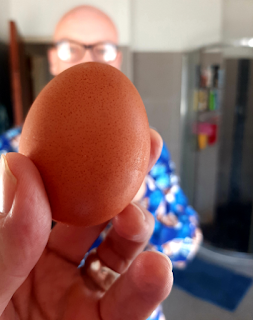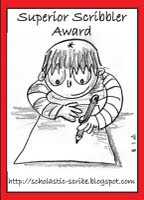As kids, an easy meal we often had was boiled eggs with toast. Cheap, filling and delicious. Here’s a deeper look at this breakfast or dinner staple, with plenty of extraneous details:
I don’t mean the
chicken or the egg discussion. Everyone knows that chickens had to be invented
first. The real primary lesson is not to explain to a child that an egg comes
out of a chicken’s butt*, especially while the child is eating an egg.
*According to howitworksdaily.com
the orifice through which an egg leaves the chicken is called the vent.
To boil an egg (let’s
assume we’re talking about a regular chicken egg), you need an egg, water,
salt, a pot and a stove. Recipes leave out things like slotted spoons, but you’ll
need one of those, too.
It takes a bit of time
for a little pot of water to come to a rolling boil (salt helps speed up the
process). Don’t get distracted during this time by daydreams such as wondering
about the expression “the pot calling the kettle black”. Both my pot and kettle
are stainless steel, and neither one has a mouth, so there’s no name-calling
going on at all.
Back to the water.
Water, water, everywhere, said Samuel Taylor Coleridge in Rime of the Ancient
Mariner, and he wasn’t referring to a pot boiling over. Funnily enough, that
poem is all based around the mythology of the albatross and the terrible
results of killing one when at sea:
‘God save thee, ancient Mariner!
From the fiends, that plague thee
thus!
Why look'st thou so?'—With my
cross-bow
I shot the ALBATROSS.’
No, the albatross only
lays one egg every few years, so eating those is more than a little mean.
Water. We take it for
granted, but you can always use the water after cooking to flush your loo or to
gargle if you happen to have tonsillitis. We don’t waste water.
A cracking good time!
There’s nothing more disappointing
in this world than having an egg crack when you place it in boiling water.
Okay, perhaps there are some contenders for bigger disappointments, but let’s
keep focusing on that egg. All the best chefs are focus-driven.
A rolling boil isn’t
just one or two desultory bubbles, the water should be seething like an aunty
at church when her child burps loudly in between hymns.
Gently roll the egg
into the water using a slotted spoon. Told you we’d need one.
The next bit is
critical! According to egg scientists, an egg must be boiled for exactly three
minutes if you live at the coast or for a little longer if you’re inland.
Something to do with, um, altitude and science pressure and stuff.
Three minutes: slightly
longer than the average pop song unless that song is Hotel California, the
most-played song in the world on the radio, which drones on and on for a
whopping six minutes and thirty seconds.
Interestingly, the
three-minute pop song has its origins in the seven-inch 45 single format. Even
though digital technology has superceded that, the length of the song preferred
by radio DJs remains at three minutes. According to Wired, the ideal length of
a song is actually 2:42, as in Tom Petty's hit "Don't Do Me Like
That". Tom was probably not talking about eggs, though.
So let’s say you press
play, the song runs though and you are ready to take your egg out.
Did you forget
something? Of course! You didn’t put your bread in the toaster. Rookie mistake.
Let’s say you remembered, though. Three minutes is also enough time to butter
your toast and to cut it into long strips, or soldiers.
Former UK Prime Minister
John Major was famously quoted as saying he preferred to eat his boiled egg
with toast soldiers, and that really is the only way to do it. Dunked into the
hot, runny golden yolk.
A memory from childhood
is that my mum would serve us boiled eggs in proper eggcups with spoons made
out of some kind of horn, probably carved goat horn. I have no idea why, but
those were our egg spoons.
Some people prefer
their eggs to be hard and crumbly, but this is not about those monsters. This
is for people who like eggs done correctly.
Another memory: I was
perhaps four or five. I had annoyed my mother by complaining about the food and
she insisted I eat everything. So I did. Shell and all.
The best way to open
the egg, once it has been transferred to a proper egg cup is to slice off the
top fifth of the egg with a knife to reveal the yolk without spilling the yolk
all over the place. Egg yolk is harder to remove from clothing than
bloodstains.
You can use the
leftover shell to annoy snails in your garden or simply dispose of it in the bin.
That’s it. An easy
breakfast suggestion, although it’s just as good for dinner.
Let me know if I left anything out…
Or
The quick version:
Ingredients:
An egg.
Water.
Salt.
Method:
Bring salted water to a
rolling boil in a small pot, gently add room-temperature egg (to avoid it
splitting).
If at coast, boil for
three minutes a few seconds longer if inland.
Serve with
buttered toast soldiers, salt and pepper to taste.













